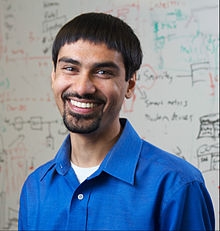
It’s been 25 years since the debut of UbiComp Lab, the University of Washington’s ubiquitous computing research initiative. In 1991, the idea of mobile health tools was far beyond the horizon. Today, however, mHealth innovation, as it relates to smartphones and health sensing, is a huge focus for the lab.
The lab is developing and testing several mHealth apps, including the BiliCam, which uses a smartphone camera to measure bilirubin in the blood; the SpiroSmart/SpiroCall, which measures lung function; CoughSense, which uses a phone’s microphone to monitor cough frequency; and BPSense, which measures blood pressure by the time taken by a pressure pulse to travel through the arterial tree.
FierceMobileHealthcare reached out to lab leader, Shwetak Patel, a professor of computer science and electrical engineering at UW, to talk about current initiatives, goals and research plans.
FierceMobileHealthcare: UbiComp researchers are developing and deploying mobile technologies that will transform health care. How do you describe the role of Ubicomp?
Shwetak Patel: The idea is that computing it going to be increasingly integrated into our daily lives in seamless ways. We'll eventually move away from laptops and desktops; this is already happening with mobile phones, smartwatches, etc. UbiComp focuses on the technology and applications of such a future.
FMH: UbiComp's researchers are leveraging the sensory capabilities of phones to provide on-the-go physiological sensing. When did this become a focal point and what are your expectations going forward?
Patel: Health has always been an important application space for UbiComp. It first started with elder care and now includes physiological sensing with mobile phones. The idea is you can have wearable and environmental sensors continually monitor various conditions and alert a user of potential problems.
My group has been trying enable self-management of various diseases. To increase compliance and to make health sensing practical, we are focusing on leveraging commodity mobile phones. We've worked on a number of different areas including technology for pulmonary, cardiac, non-invasive blood screening, and sleep.
FMH: What is the biggest challenge in developing mHealth technology and how do you think it should be solved?
Patel: One of the biggest challenges is building these solutions in such a way that can integrate into the exciting care system to show initial efficacy of such tools. We are currently going through the [U.S. Food and Drug Administration] with some of our technologies and I would say my advice is to consider the regulatory process early in the research process. It can really help better inform your studies and technology development.
In the next 10 years, I think our phones and watches will be able to passively monitor our health and proactively let us know of any issues that may arise.
Editor's Note: This interview has been edited for clarity and length.